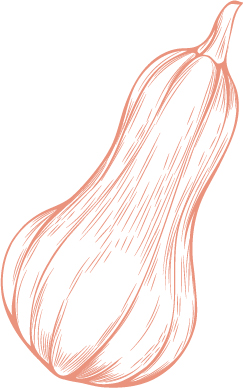
Created by Binya Koatz and daph ben david with Keshet

Do you usually eat apples and honey on Rosh Hashanah? Like the Passover seder, where displaying and eating different foods is a form of participatory magic-making, we eat and bless symbolic foods on Rosh Hashanah to help us be present in spiritual transformation for ourselves and our community.
This embodied ritual is called simanim (“signs”) in Hebrew and ye’i rasones in Ladino (after yehi ratzon, “may it be the Divine will”). This practice is first described in the Babylonian Talmud.* Rabbi Abaye says “סימנא מילתא היא”, or “Simanim/omens are meaningful,” and instructs us to gaze upon certain foods – including squash, fenugreek, and dates – to guarantee a good year on Rosh Hashanah. In the many centuries since Jewish communities around the world have interpreted and added their own foods to this custom.
The foods for simanim are usually chosen for their physical attributes, or for puns on their names in Hebrew, Ladino, Yiddish, and other languages. In this resource are some traditional and new LGBTQ ye’i rasones for your Rosh Hashanah table. As we move into a new year, let’s all work some participatory magic to usher in a more just and fabulous world!

These instructions are a guideline and an offering. Feel free to use whatever speaks to you, and remix it in whatever way feels right. You can make magic with every taste on your table!
On the first and second nights of Rosh Hashanah, we lay out the foods we want to bless on our dinner tables. In some traditions, the blessings for qiddush (wine/juice) and motzi (bread) are recited, and then we bless the special Rosh Hashanah simanim. In other traditions, we bless the wine or juice, then the simanim, and then the bread.
For each food item, start the blessing with the invocation below, and then finish with the intention for each food. All these blessings use a mix of feminine God-language and gender-expansive grammar developed by the Nonbinary Hebrew Project.
Yehi ratzon milfanekhe, adonai eloteinu v’elotei doroteinu….
May it be your will, Eternal One, our G-d and G-d of our (tr)ancestors…
These represent a sampling of traditions and are by no means a complete or definitive list. Here we have included the English and Ladino names for the foods.

She’techad’shi aleinu shana tova u’metuka
…that our year be renewed with sweetness and goodness.
Why? Apples and honey are sweet, just as our year
should be!

…She’nih’yeh m’le’imot mitzvot karimon
…that we be filled with mitzvot as a pomegranate is full of seeds.
Why? Pomegranates are said to have 613 seeds —
the same number of mitzvot as in the Torah!

…She’tikre’i ro’ah g’zar dineinu, v’yikar’u l’fanecheh zachiyoteinu
…that you shred any bad fortune for us in the year to come, and let our beautiful deeds be proclaimed before you.
Why? The words for “gourd,” “shred,” and “proclaim” in Hebrew all sound the same: “kara.”

…She’istal’ku oyveinu v’soneinu v’chol m’vakshei ra’ateinu
…that you remove injustice from the world and stop those that seek to cause harm.
Why? The word for “beet” and “remove” in Hebrew, “selek”, are the same.

…She’nih’yeh l’rosh v’lo l’zanav
…that we find ourselves on the forefront of movements for justice, with the courage to be bold in our leadership.
Feel free to substitute a head of lettuce, cabbage, or cauliflower as a veg option!
Why? “Head” is used as a synonym for “leader.”

…that we grow strong and unified as a bunch of grapes, delighting in the sweetness of our solidarity as people across the LGBTQ spectrum.

…that we be deeply rooted and bold, sprouting up between the cracks of our systems to find the light, brightening even the bleakest of landscapes we may find ourselves in.
NOTE: Dandelions on city streets often have pesticides – please harvest carefully from an unsprayed field or garden!

…that we find our place as soft upshoots in a deep web of community, interconnecting in our wisdoms, to renew the world and transform it into one free of homophobia, transphobia, and all types of oppression.

…that those who will come out in the coming year be held softly and lovingly in our community, and be honored for their growth and the deep and nourishing wisdom that they already carry.

…that we refuse false binaries (whether male/female or fruit/vegetable!), and delight in our tender uniqueness.